Table of Contents
Get started with MyPerfectResume today!
- Build a resume on any device
- Pick an ATS-friendly template
- Tailor with AI copy suggestions
Why this resume works
- Quantifies accomplishments: Measurable accomplishments like reducing production time by 30% at SonicWave Studios showcase the applicant’s tangible impact and efficiency improvements.
- Highlights industry-specific skills: Mastery in audio mixing and live sound engineering, coupled with a Pro Tools certification, shows the applicant’s alignment with industry-specific roles in music and sound production.
- Illustrates problem-solving ability: Introducing a novel sound editing technique exemplifies the applicant’s problem-solving skills, addressing complex challenges in audio clarity and creativity.
More Audio Engineer Resume Examples
Take a look at our audio engineer resume examples to see the best ways to highlight your technical expertise, creativity, and collaboration skills. These media and communication resume examples will help you build a resume that stands out in the industry.
Entry-Level Audio Engineer
Why this resume works
- Centers on academic background: The applicant’s academic background, including both bachelor’s and master’s degrees, lays a solid foundation for their early career achievements in audio engineering.
- Shows digital literacy: Mastering tools like Pro Tools and Logic Pro showcases the applicant’s computer skills necessary for success in tech-driven workplaces.
- Effective use of keywords: Incorporating keywords like “audio mixing” and “live sound engineering,” the applicant strategically optimizes their resume to navigate applicant tracking systems efficiently.
Mid-Level Audio Engineer
Why this resume works
- Includes a mix of soft and hard skills: By mixing technical expertise like Pro Tools with interpersonal skills, the applicant balances team leadership and hands-on sound design to deliver award-winning audio projects.
- Points to measurable outcomes: Quantifiable results, such as improving sound quality by 30% and reducing production time by 20%, highlight the applicant’s impact on efficiency and project outcomes in high-pressure environments.
- Displays technical expertise: Specialized credentials like Certified Audio Engineer and Pro Tools Expert reinforce their mastery of industry tools, while managing six-figure audio budgets exemplifies practical application of their technical knowledge.
Experienced Audio Engineer
Why this resume works
- Showcases impressive accomplishments: The applicant’s achievements, such as improving sound design efficiency by 20% and saving $10K with new tech, reflect senior-level impact.
- Focuses on work history: The chronological resume format neatly outlines extensive career progress from acoustic engineer to audio engineer, emphasizing the applicant’s rich work history.
- Emphasizes leadership skills: Managing audio mixing for over 50 projects showcases the applicant’s leadership skills, demonstrating their ability to lead teams and oversee complex tasks.
Audio Engineer Resume Template (Text Version)
Suki Kim
Austin, TX 78706
(555)555-5555
Suki.Kim@example.com
Professional Summary
Expert audio engineer with 9 years in sound design, Pro Tools certified, skilled in mixing and live sound. Award-winning professional enhancing audio clarity and production efficiency.
Work History
Audio Engineer
SonicWave Studios – Austin, TX
June 2021 – August 2025
- Mixed over 300 tracks professionally
- Increased audio quality by 40%
- Decreased production time by 30%
Sound Technician
Audio Sphere Productions – Austin, TX
May 2017 – May 2021
- Developed sound designs for 15+ films
- Enhanced sound clarity by 50%
- Coordinated live sound setup for 50+ events
Music Recording Specialist
Harmony Recordings – Dallas, TX
January 2013 – April 2017
- Recorded 200+ sessions efficiently
- Optimized recording protocols by 25%
- Reduced studio downtime by 15%
Skills
- Sound Design
- Audio Mixing
- Pro Tools
- Live Sound Engineering
- Sound Editing
- Music Production
- Audio Post-Production
- Signal Processing
Education
Master’s Degree Audio Engineering
University of Southern California Los Angeles, California
June 2012
Bachelor’s Degree Music Technology
University of California, Berkeley Berkeley, California
June 2010
Certifications
- Certified Professional Audio Engineer – Audio Engineering Society
- Pro Tools Operator – Avid Technologies
Languages
- Spanish – Beginner (A1)
- French – Intermediate (B1)
- Italian – Beginner (A1)
Related Resume Guides
Advice for Writing Your Audio Engineer Resume
Dive into our advice section on how to write a resume tailored for an audio engineer role, where creativity meets technical expertise. Whether you’re mixing tracks or fine-tuning live sound, your resume should hit the right note with potential employers. Discover tips designed to highlight your unique skills and experiences in the audio engineering field, ensuring you stand out in a competitive industry.
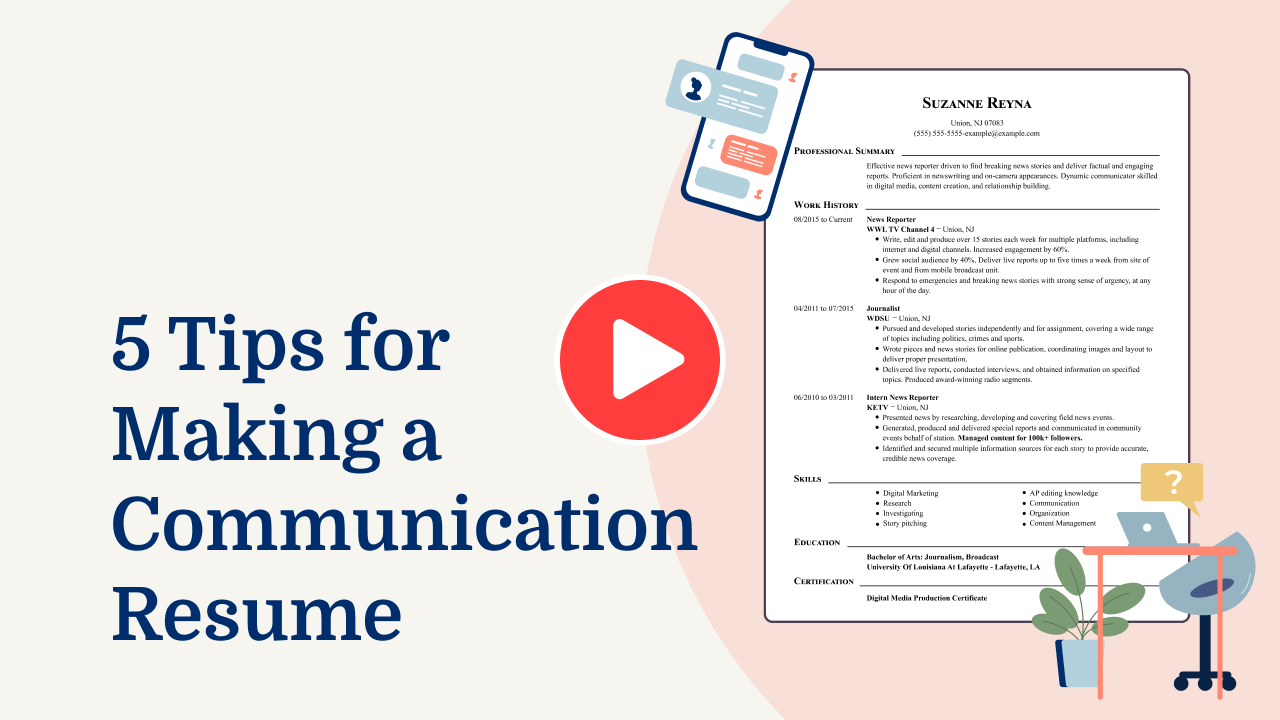
Showcase your portfolio or projects
For an audio engineer, showcasing a portfolio or projects on your resume offers a clear picture of your skills and creativity. Audio engineering relies heavily on practical work, and showing specific projects helps demonstrate what you can do. Whether you’ve worked on live concerts, studio recordings, or film soundtracks, having examples makes your abilities more concrete to potential employers.
When building your portfolio, include links to online platforms like Behance or a personal website where you’ve uploaded your work. Remember that freelance gigs, school assignments, and side projects are all worth including.
Describe each project as if it were a job entry: state the project’s name and who it was for—like a client or company—if relevant. Add a brief description of what the project involved and highlight your key contributions and the impact you made.
This structured approach not only shows off your technical skills but also how you solve problems creatively and collaborate with others. A well-organized showcase makes it easier for hiring managers to understand your experience and see how you’d fit into their team.
Example of a projects section
Live Sound Mixing for International Music Festival
SoundWave Productions
July 2023
- Engineered live sound mixing for over 30 bands, ensuring audio quality across diverse genres.
- Implemented advanced noise reduction techniques to improve clarity in outdoor settings.
- Coordinated with performers and stage managers to meet technical requirements and deliver seamless performances.
Audio Restoration for Historical Documentary
Echo Media Group
Feb 2022 – Nov 2022
- Restored archival audio recordings, improving speech intelligibility and reducing background noise.
- Used digital audio workstation tools for precise editing and sound enhancement.
- Collaborated with filmmakers to align audio elements with visual storytelling.
Get inspired by checking out professional resume examples to see how others showcase their skills and experiences effectively.
Emphasize your most relevant skills
In the role of an audio engineer, both technical and soft skills are key. On the technical side, knowing how to use certain software like Pro Tools or Logic Pro is important. But don’t forget about soft skills like communication and teamwork, which help you work well with others in creative projects.
An effective way to show these skills on your resume is by having a skills section where you list both your tech abilities and artistic talents. To make your resume even stronger, try weaving your skills into the bullet points in your work experience section.
For example, instead of just saying “mixed audio tracks,” you might say “used Pro Tools to mix audio tracks while collaborating with a team.” This approach not only highlights what you did but also shows how you used your skills in real-world situations.
By doing this, you give potential employers a clear picture of how you’re able to apply both your technical know-how and interpersonal abilities effectively as an audio engineer.
For audio engineers, choose a resume format that highlights your technical skills, certifications, and experience in various audio settings.
Choose a professional resume template
For an audio engineer, choosing a resume template that balances creativity and professionalism is key. Look for templates with clean lines and structured layouts that feature a clear visual hierarchy to guide the reader’s eye smoothly through your information. Avoid overly decorative designs, which can distract from showcasing your skills and experience.
Select a format optimized for ATS compatibility to ensure it gets noticed by automated systems used by many employers. Simple fonts, standard headings, and straightforward bullet points often work best in these situations. This approach helps maintain readability while still allowing you to subtly showcase your creative side through professional design elements.
Stick to templates that prominently highlight important sections like work experience, skills, and education. A well-organized resume makes it easier for hiring managers to quickly find the information they need, increasing your chances of landing the job. Remember, presenting yourself professionally without sacrificing clarity or functionality in your resume design is the goal.
Build an audio engineer resume in minutes with our easy-to-use Resume Builder. Choose a professional template, add your details, and make a strong impression on employers.
Format your resume properly
Proper resume formatting is key to readability and making a good impression. For an audio engineer with consistent experience, use a chronological resume. This format highlights your past roles and career growth in the field and helps employers understand your expertise in audio engineering tasks and projects more clearly. Explore tips below to start crafting a polished resume.
5 resume formatting tips
- Use clear section headings: Organize resume with sections like “Work Experience,” “Skills,” and “Portfolio.”
- Select consistent fonts: Choose readable fonts like Arial or Calibri for uniformity throughout.
- Implement bullet points: Use bullet points to highlight key duties, skills, and achievements succinctly.
- Aim for one page: Keep the resume to one page unless possessing extensive experience.
- Ensure proper spacing and alignment: Maintain clean formatting with adequate spacing for a professional appearance.
Don’t let your resume get stuck in the system! Use our ATS Resume Checker to find common mistakes and get advice on how to make your resume better.
FAQ
Do I need to include a cover letter with my audio engineer resume?
Including a cover letter with your audio engineer resume can significantly improve your application. You can use our Cover Letter Generator to craft a personalized cover letter effortlessly.
A cover letter lets you highlight your passion for audio engineering, any specific projects or technologies you’re experienced with, and why you’re excited about the particular role or company.
For instance, if the studio specializes in a genre of music or has state-of-the-art equipment you’re familiar with, this is the place to mention it. Exploring various cover letter examples can help you find one that resonates with your style and experience.
Tailoring your cover letter will show potential employers that you’re genuinely interested and have taken the time to understand their needs.
How long should an audio engineer’s resume be?
For an audio engineer, a one-page resume is typically perfect for capturing key skills like skill in audio editing software, experience with sound mixing, and familiarity with various recording equipment. This format keeps your qualifications concise and focused.
If you’ve amassed substantial experience or hold specialized certifications in complex audio technologies, a two-page resume might be more appropriate. This allows you to thoroughly detail your technical expertise and notable projects without sacrificing clarity.
Explore guidelines on how long a resume should be to help determine the most effective length based on your career achievements and goals.
How do you write an audio engineer resume with no experience?
Crafting a resume with no experience can be challenging as an audio engineer. Highlighting your skills and education is essential to make an impact. These tips will help you present yourself effectively and stand out in the field:
- Highlight relevant coursework: List any audio engineering classes or projects you’ve completed during your studies. Include details about the equipment used, software learned, and any special techniques mastered.
- Showcase technical skills: Even without work experience, emphasize your skills with audio editing software like Pro Tools, Logic Pro, or Ableton Live. Mention any sound design or mixing skills that could be valuable.
- Include extracurricular activities: If you’ve worked on school productions, volunteered for events requiring sound setup, or participated in music clubs or societies, include these as they demonstrate practical application of your skills.
Explore our guide on writing a resume with no experience for additional examples and actionable tips from Certified Professional Resume Writers.
Rate this article
Audio Engineer
Share this page
Additional Resources

Engineering CV Examples & Templates
Engineers play many roles in designing, building and improving infrastructures, technologies, medical equipment and more. Employment in this occupation is expected to grow 4% over the next decade, bringing in
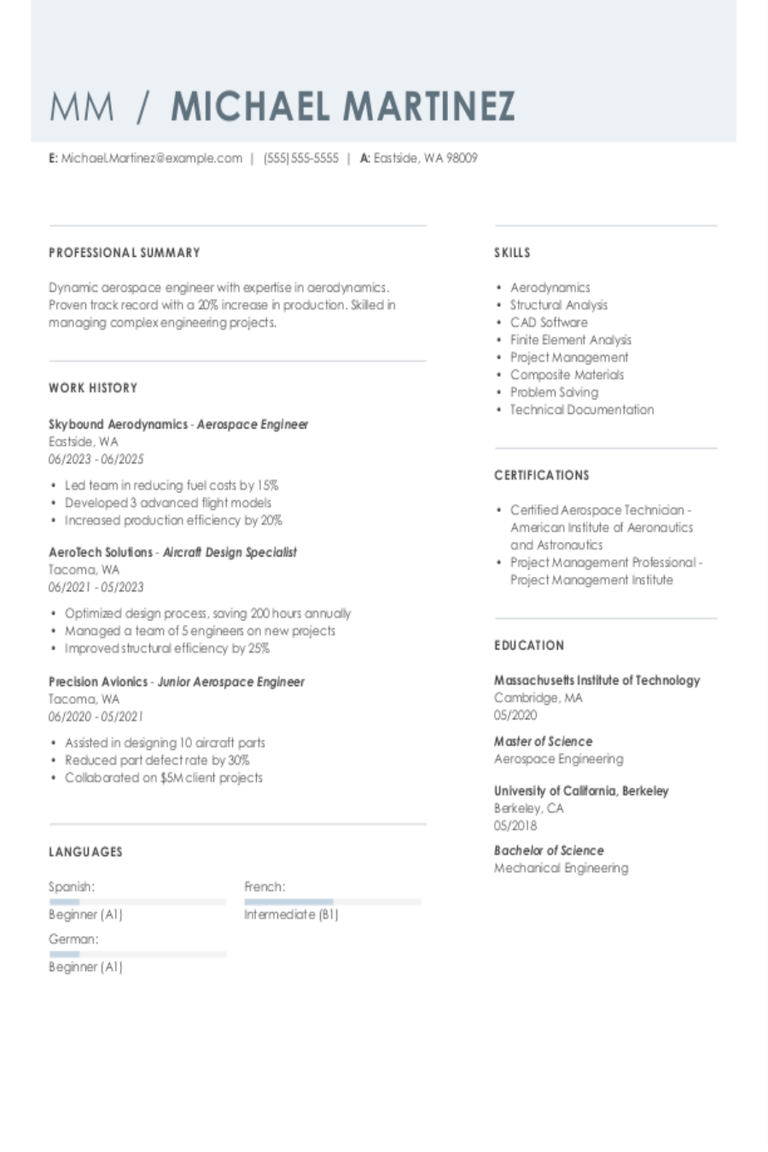
Aerospace Engineer Resume Examples & Templates
Explore aerospace engineer resume examples that show you how to highlight your experience designing aircraft, testing systems, and solving technical problems.Build my resumeImport existing resumeCustomize this templateWhy this resume
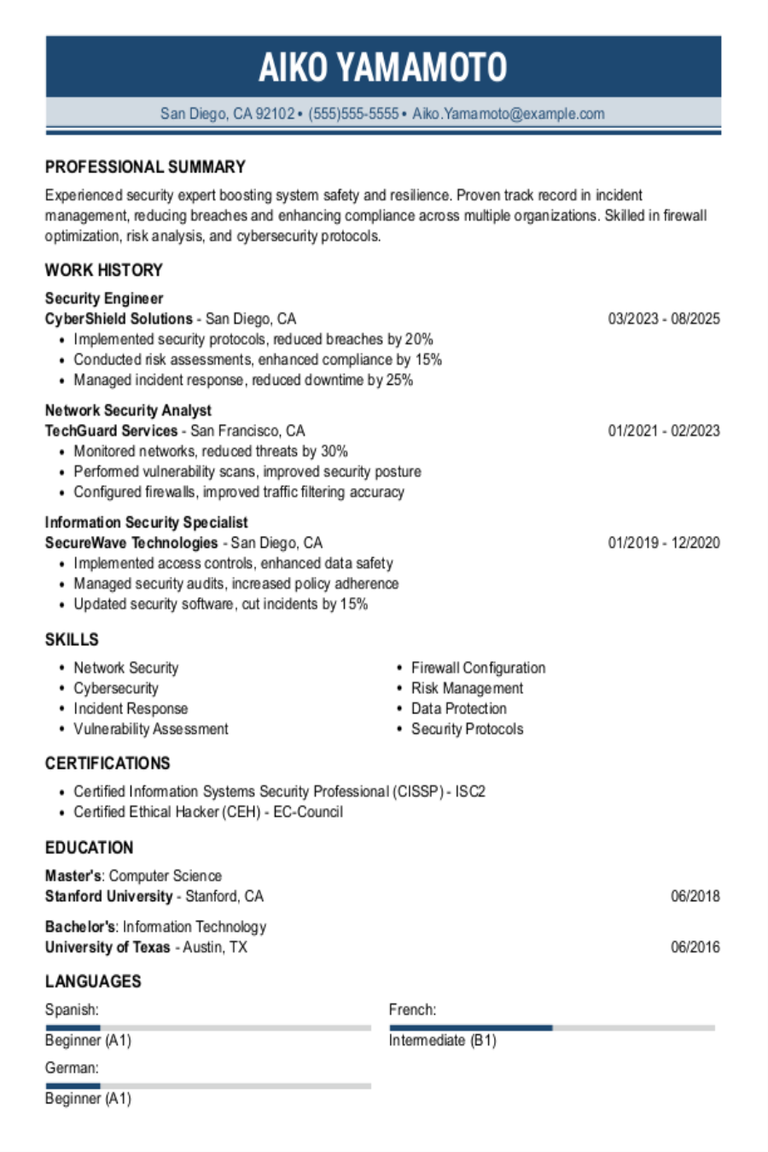
Security Engineer Resume Examples & Templates
Explore security engineer resume samples that highlight tech skills and experience in protecting data. Get tips to showcase your problem-solving abilities and cybersecurity expertise.Build my resumeImport existing resumeCustomize this templateWhy
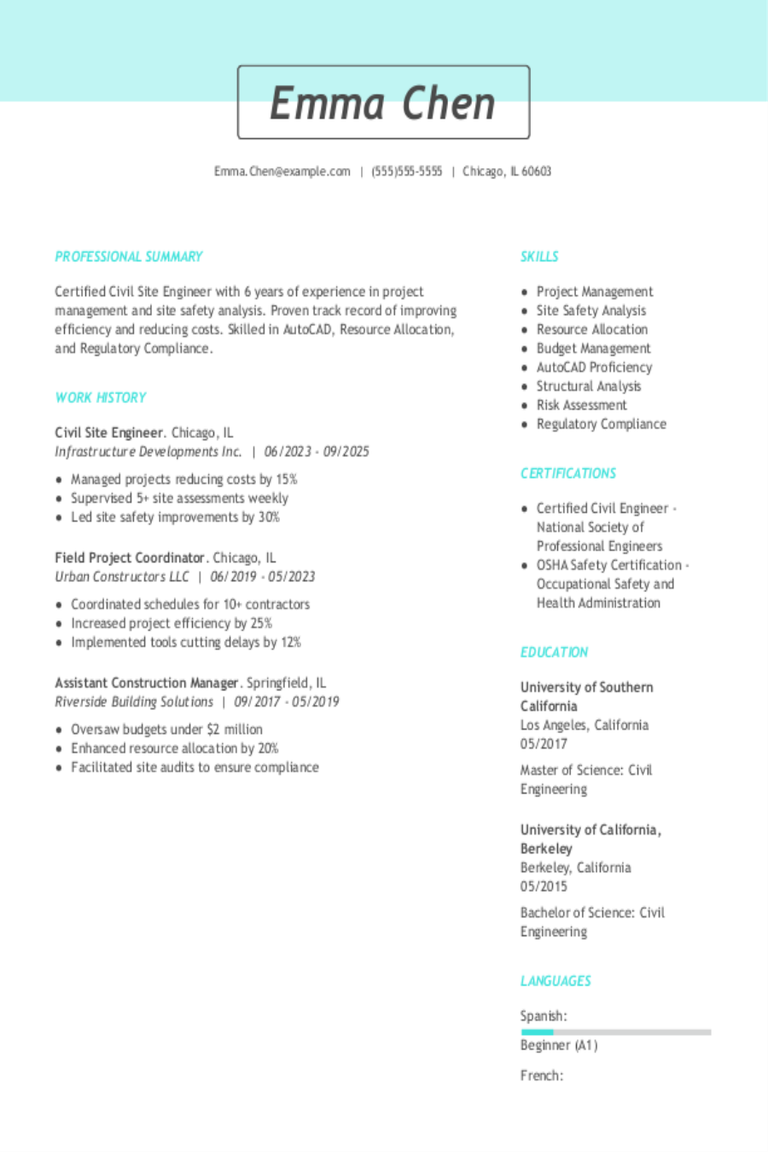
Civil Site Engineer Resume Examples & Templates
Browse civil site engineer resume examples to see how to highlight your experience planning projects, overseeing construction, and ensuring safety on site. These examples and tips help you highlight your
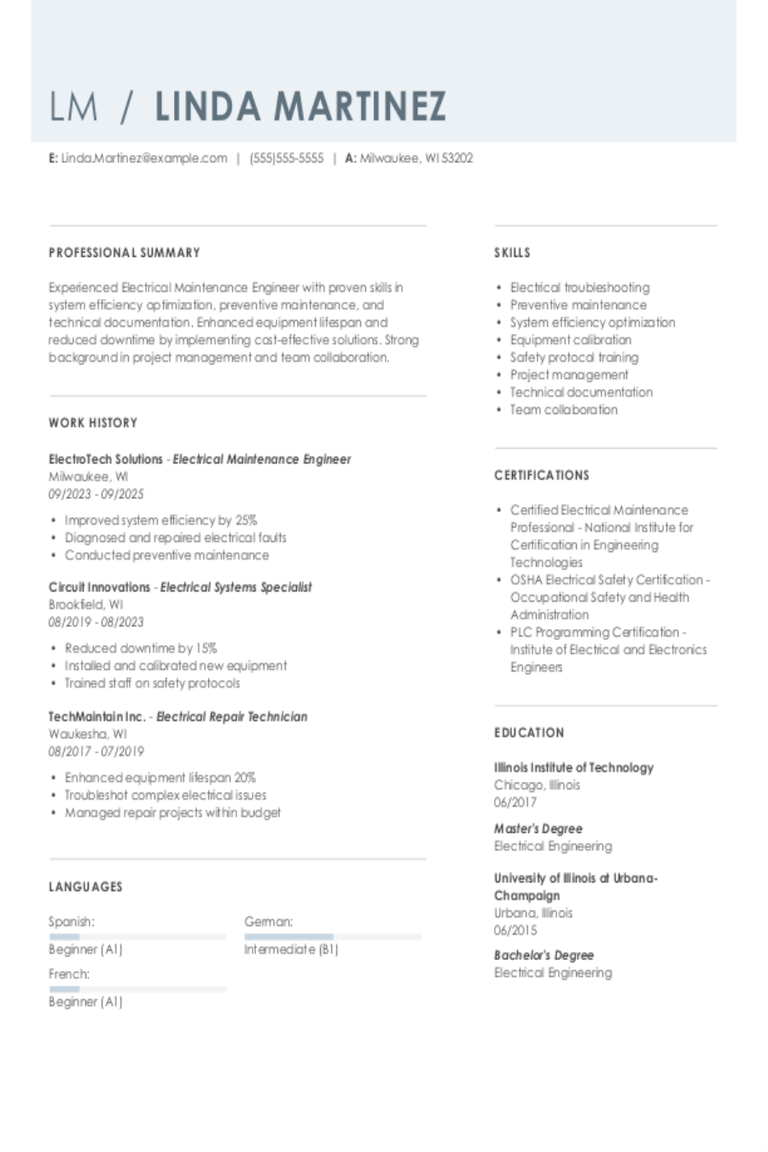
Electrical Maintenance Engineer Resume Examples & Templates
Explore electrical maintenance engineer examples and tips to learn how to effectively showcase your hands-on experience, teamwork, and problem-solving expertise.Build my resumeImport existing resumeCustomize this templateWhy this resume worksQuantifies accomplishments: By
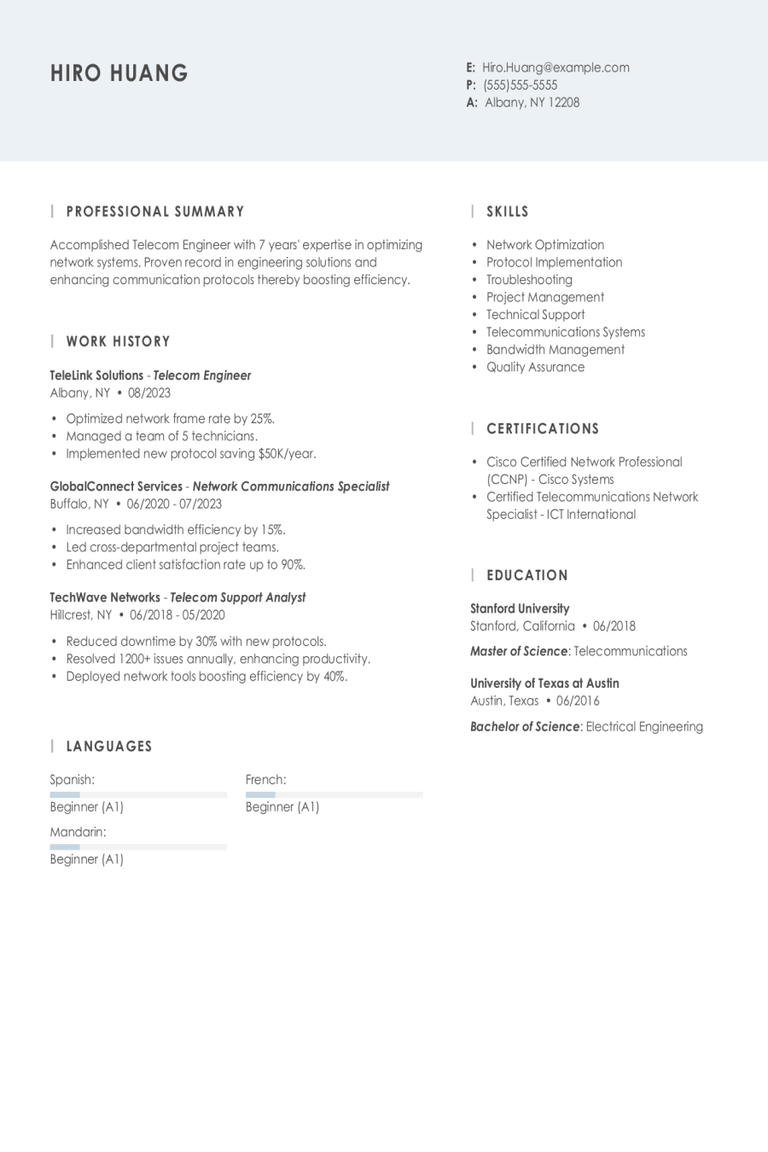
Telecom Engineer Resume Examples & Templates
Explore telecom engineer resume examples that highlight the technical know-how and problem-solving skills needed in the field. Get tips to showcase your experience with networks, systems, and communication technologies to
